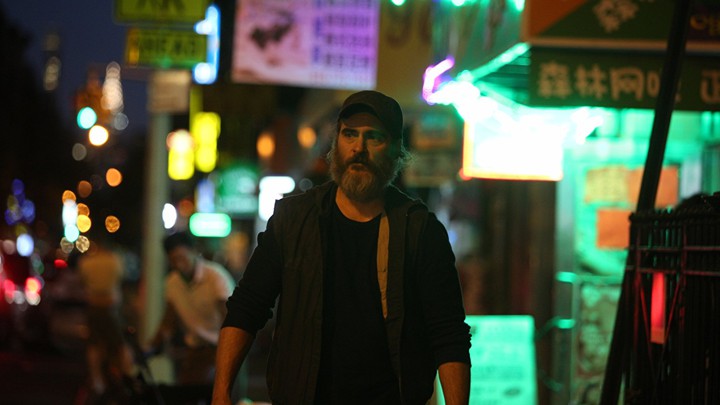The stripped-down plot only scrapes the surface of You Were Never Really Here. This is no Taken-esque vigilante actioner. Instead, it’s a character study of a depressive who might act like John Wick but feels like Nic Cage in Leaving Las Vegas. This combination of the physically and the mentally visceral is a masterstroke out of Jonathan Ames original story and adapted through Ramsay’s eye and Phoenix’s manner. Joe is a deeply afflicted with the kind of PTSD that’s practically a dissociative disorder. He’s floating above events, watching them as they happen, much like the camera is in repeated shots. Brief and indelible flashbacks to points in Joe’s life aren’t for backstory as much as they are a window into what it’s like to be the main character, plagued by images that are seared onto his retinas. He repeatedly seeks out sense memories that bring him back to certain moments, marking him as unable and unwilling of escaping their orbits, and Ramsay revels in these triggers. She and editor Joe Bini have sculpted a nightmarish dive into what it means to live an unremedied traumatic life.
As the film demonstrates, Joe is not wrong to feel the way he does. While his past comes in flashes, the present unfolds in matter-of-fact cruelty, validating his treatment of those who abuse Joe’s quarries. The main setpiece of the film, wherein Joe first rescues Nina, is mostly filmed through security cameras, grainy black and white footage of Joe applying his extremely-apt weapon of choice (the easily concealed fury of the ball peen hammer) to the skull of some criminal john. In his search, he’ll open doors and look in without the camera following him. Ramsay goes the unexploitative route, leaving it to Joe’s focused reaction to fill in the depraved blanks.
For all its bleak subject matter, You Were Never Really Here is no dreary miserabilist slog through the human underworld. Joe is leavened by his relationship with his mother (Judith Roberts), an affectionately cantankerous woman who Joe is taking care of. They have a phenomenal back and forth that’s believable alongside the agony that lives inside Joe’s head. She’s a respite for him and, because the film is so intimately entangled with him, the viewer as well. The film starts with Joe demolishing guards and pimps with his hammer, establishing himself as the brick shithouse he appears to be, but his first scene with his mother is a study in contrasts, gently removing the glasses from her face while she sleeps. Being able to define himself positively in relation to another human is the only thing keeping him going, and Joe jealously guards this part of his life from the rest of the world.
Phoenix has put his stamp on the last decade with immersive and challenging performances, and Joe is one of his best creations. A largely physical performance, not only in the dispensing of violence but in body language and posture, Phoenix fully inhabits the role. He hunches, he mumbles, he looms, he charges. His every gesture is designed to vanish into his surrounding but he’s still incredibly watchable in every frame. He’s able to make his monotone character deeply affecting, as if the scared little boy is still present and visible underneath all that girth. His final scene is one of the best things Phoenix has ever done, a wrenching and shattering finale that speaks volumes to how Joe sees himself in the world.
At 90 minutes, You Were Never Really Here is as compact and powerful as its protagonist, getting in and out of its aims with clarity and efficiency. Ramsay again reminds the audience that she is an underserved master of mood and style, attracting the best talent to her projects whether it be Phoenix or Jonny Greenwood composing an eerie and beautiful score. Her film is thus far the best of what’s shaping up to be a great cinematic year, and she’ll hopefully continue to dominate future years at a more rapid clip. A

 RSS Feed
RSS Feed